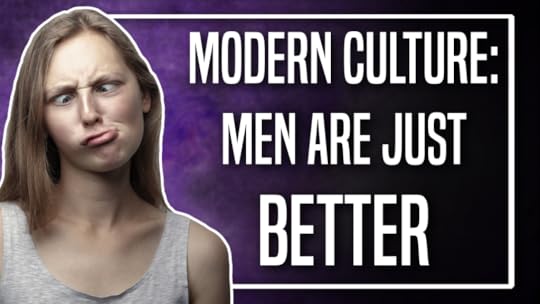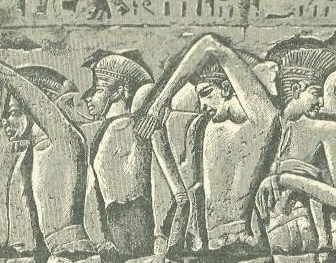Dewayne Bryant's Blog
June 26, 2025
Bible Contradictions: Does God Respect Anyone?

Alleged contradictions are the holy grail of biblical criticism. When trying to find contradictions in the Bible, critics typically look for two passages that seem to say different things, without considering anything else. They usually ignore essential things like vocabulary and context (which is how these discrepancies are created initially). One online resource that does a spectacular job of this is the Skeptic’s Annotated Bible.
In the entry titled “Does God respect anyone?” the text says that in some places, the Bible says yes, and in others, the Bible says no. This is the kind of thing we’re talking about. Critics often use an older translation, like the King James Version, where the wording gives them enough room to shoehorn a supposed contradiction into the text. And this is one of those cases. Let’s explore some individual examples.
“And the Lord had respect unto Abel and to his offering: But unto Cain and to his offering he had not respect” (Genesis 4:4b-5a). Right off the bat, we can see that the word respect is being used differently than how we might use it today. The Hebrew word šāʿâ means to look at with approval, and in this instance, it means “to accept.” Simply put, God accepted Abel and his offering. The word respect as used by the translators of the King James Version had a different shade of meaning than the modern use of the word. “And God looked upon the children of Israel, and God had respect unto them” (Exodus 2:25). Here we have a different Hebrew term. It is the word yādaʿ, which primarily means “to know.” That is a very different meaning from the modern definition of respect. Modern versions correctly translate this phrase as “God knew.”“For I will have respect unto you, and make you fruitful, and multiply you, and establish my covenant with you” (Leviticus 26:9). Once again, we have another different Hebrew term. The word used here is pānâ, meaning “to turn.” The verse should be accurately translated as “I will turn to you and make you fruitful and multiply you and will confirm my covenant with you.”“Though the Lord be high, yet hath he respect unto the lowly: but the proud he knoweth afar off” (Psalm 138:6). This is the fourth use of the word respect, and yet again we have a different Hebrew word: ra’ah, meaning “to see, consider.” When we look at this verse, it’s saying that God is close to the lowly but distances himself from the prideful. You can see this same approach all over the Bible, especially in the ministry of Jesus. He often showed concern for the downtrodden and the helpless, and was typically at odds with arrogant elitists. That’s precisely what this verse is talking about.When we consider the original languages, we can see that the modern word “respect” doesn’t fit these verses most of the time. So we’ve got a translation issue here. Specifically, an older translation where the key word has changed in meaning for a modern audience. Also, the translators who worked on the King James version chose to render several different Hebrew words with just one English word. If you aren’t paying attention to that fact, it will cause some confusion.
There are other passages where the Skeptics Annotated Bible says that God doesn’t respect people. But we’ve already seen that the author here has a massive problem with understanding languages. It only gets better from here. Let’s look at some of those passages. Let’s work through some of these passages.
“Wherefore now let the fear of the Lord be upon you; take heed and do it: for there is no iniquity with the Lord our God, nor respect of persons, nor taking of gifts” (2 Chronicles 19:7). So does this verse contradict the others we’ve seen? Does God not respect people? Well, the Hebrew phrase maśśoʾ pānîm means literally “to lift up the face.” It’s an idiomatic expression that means to show favor. Simply by looking at the context, you can get a hint that there’s something else going on here other than giving someone respect, because the word is sandwiched between iniquity and bribery. Modern translations accurately render this as “partiality.” So the text is not telling us that God never respects people, it’s saying that he doesn’t show favoritism. “God is no respecter of persons” (Acts 10:34). The word here is the Greek term prosōpolēmptēs, which means to show favoritism or unjustly treat one person better than another. Paul also says that God is no respecter of persons in Ephesians 6:9 and says something similar in Colossians 3:25. He uses the same Greek word in both places. So this isn’t about showing respect, it’s about showing partiality.God is “without respect of persons” who “judgeth according to every man’s work” (1 Peter 1:17). Just by reading the entire verse, we can get a sense that there’s more to this than meets the eye. And when we look at the Greek, it becomes even clearer. The word aprosōpolēmtōs describes someone who behaves in an unprejudiced manner. So the apostle isn’t saying that God disrespects people; only that he doesn’t play favorites.By examining the original languages, we can see that many so-called contradictions are easily solved. The Skeptic’s Annotated Bible is a gold mine of problems with more bark than bite. It’s easy to see that the author of this book didn’t take the time to understand the difference between the Modern and Early Modern uses of the word “respect” or investigate the underlying Greek and Hebrew terms. Once we do this, this supposed contradiction evaporates like so many others—which is typically what happens when you take the time to do a little research.
For the video version of this post, please go here.
June 10, 2025
When Memes Go Too Far: Speaking the Truth in Love

Most of us have probably been there: scrolling through social media, laughing at a clever meme someone shared, only to realize it includes something objectionable, perhaps some crude humor or inappropriate language. Well-meaning, even vigilant, Christians can share memes without spotting these details. At some time or another, most of us have probably hit the share button without noticing something objectionable in the post.
All Christians know that Paul warns about corrupting talk (Ephesians 4:29). He uses the Greek word sapros, which carries the idea of something rotting, decaying, and unpleasant. This kind of language is not merely unpleasant—it is spiritually toxic and reveals a deeper issue within the heart. Jesus indicates that what comes out of our mouths indicates who we are on the inside (Matthew 15:18). Rot-filled speech likely means that a person is decaying spiritually.
I think the basic idea behind the New Testament teaching on corrupt speech could also include unvoiced humor, social media posts, and memes. So, it applies not only to what we say but also to what we communicate. A meme might be funny or relatable in some way, but if it includes something ungodly, it sends a mixed message about us.
Let’s look at another aspect of this issue. How do we respond when we see offensive content shared by another Christian? For the sake of our post, let’s assume that the content has been shared by mistake. Let’s look at two contrasting approaches.
First, we can assume that the person shared it intentionally and rebuke them accordingly. We can get on our high horse and treat the other person with the condescension they so richly deserve. I had this happen recently. I shared a meme that had a three-letter abbreviation for an objectionable phrase. I mistook it for a similarly spelled word when I read it over and shared it; unfortunately, I did so without realizing my error. Someone on Facebook messaged me, letting me know in no uncertain terms how offended she was by my post, even including a screenshot to make sure I wouldn’t miss it. I took the post down immediately and had no further contact with her.
The other option is to assume that the person made a mistake. A few months ago, I shared a meme that was not objectionable but came from a source with an objectionable word in the screen name. It was smaller print, and once again I missed it. Very quickly, a Facebook friend I had never met in person messaged me, starting with “Hey, I don’t know if you knew this, but …” I was horrified, and I immediately took down the post as quickly as my fumbling fingers would permit. Her message reminded me of Paul’s statement, “Let your speech always be gracious, seasoned with salt” (Colossians 4:6). We messaged back and forth, me offering an apology and her thanking me and saying she knew it was probably just a slip-up on my part. I thanked her profusely, and we went on about our days.
I don’t think you’ll have any difficulty determining which response satisfied both a passion for truth that prompts us to engage with others who have stumbled (Luke 17:3) but also the need to do so with the graciousness the New Testament requires (Galatians 6:1).
Many of us share things online. Sooner or later, even the most careful may let something slip beneath the radar. If you find something objectionable posted online, you can never go wrong assuming the best and approaching the person with gentleness. This is the spirit behind the advice, “A soft answer turns away wrath, but a harsh word stirs up anger (Proverbs 15:1). This proverb tells us how to handle anger once it’s come out, but we can also use it preemptively, can’t we?
Levelling accusations, complaining, and broadcasting how offended we are is much less helpful than employing a spirit of meekness (the very definition of which is “strength under control”). Anyone can throw a temper tantrum or let loose a self-righteous tirade. It takes much more control and Christlikeness to approach someone with gentleness.
We all appreciate grace when we receive it; this is a universal human response. For those of us trying to imitate Christ, the real test is not only how ready we are to receive grace but also how quickly we are willing to give it.
May 14, 2025
Modern Culture: Men are Better Women than Women

Our world is full of diverse viewpoints, especially regarding gender. For many people, there are only two genders. For others, it could be dozens. According to many modern people, including many feminists, paradoxically enough, dudes who try to be female are simply better than women. They’re not just better than women, they’re better women than women.
In 1976, the United States needed a win in the decathlon at the Olympic Games. Soviet athlete Mykola Avilov was the world record holder until Bruce Jenner arrived. Jenner set the new world record and conquered the Soviet Union. Years later, he changed his name to Caitlyn and conquered women’s lingerie. In 2015, Jenner was named as one of Glamour Magazine’s Women of the Year along with actress Reese Witherspoon. Among her other significant accomplishments that year, Witherspoon founded a production company and was nominated for an Oscar. Jenner changed his name and put on lady clothes. Roughly equivalent achievements, obviously. And Jenner did it halfway through the year, meaning he only had to work half as long to get the same award that Witherspoon earned. And if he only had to work half as long, then it must mean that he was twice as good at being a woman.
Two years later, in 2017, Glamour bestowed another one of its Women of the Year awards on Eli Erlick, who was born male, looks male-ish, has a masculine name, often dresses in a coat and tie, and identifies as gender nonconforming. In other words, there’s almost nothing feminine about Erlick at all, yet he still won Woman of the Year. He doesn’t look like an Idris Elba or an Ewan McGregor, but if they decided to wear a dress, they could get someone to give them a woman of the year award, too. Society hands out these awards to dudes like Halloween candy, because our culture is teaching us that it’s not that hard for men to be better women than women.
Sports have been a particularly contentious area. Lia Thomas is an athlete who barely cracked the top 500 of collegiate swimmers when competing as a man. Then he transitioned, put on a one-piece, and smashed women’s records. He also narrowly lost in the NCAA Woman of the Year award. So, I guess Thomas will have to settle for winning national championships and setting records that no biological female will ever break, just like all the other biological males who claim to be women.
Politics is rife with guys who do it better than girls. For instance, US State Representative Leigh Finke was elected Minnesota’s first openly transgender person to serve in the Minnesota legislature. USA Today named him Woman of the Year in 2023 after serving only two months in public office. That means he’s, like, 600% better at his job than any female representative. Tough break, ladies.
Early in 2023, First Lady Jill Biden and Secretary of State Antony Blinken awarded Alba Rueda, a biological male, an International Women of Courage Award. This award could have gone to any number of women who participate in efforts like Doctors Without Borders in war-torn areas, serve in the military, fight female oppression in third-world or Islamic countries, or do some other job that is mentally taxing and physically dangerous. But, being an activist and fighting injustice from your air-conditioned government office is, like, so hard.
Strangely enough, beauty pageants have followed suit. In 2018, Angela Ponce became the first biological male to win the title of Miss Spain; Rikkie Valerie Kolle became the first to win the title of Miss Netherlands in 2023.
You see, our world is just geared toward men. Women have to work much harder to get the same respect in many occupations. And guys who decide to be women are lavished with one award after another when those awards were meant for biological women. From the standpoint of a biblical worldview, that is not fair. Like anyone else with an entry-level amount of common sense, the biblical writers recognize the equal worth and value of men and women.
In a male-dominated culture in a time when women were practically invisible in society, there are a surprising number of heroines in the biblical text. The Hebrew midwives Shiphrah and Puah rightly commit civil disobedience and refuse to participate in the murder of Hebrew infants (Exodus 1:17). Ruth is praised as a woman who mirrored the character of God through her loyalty to her mother-in-law Naomi, and gains the respect of her entire community (Ruth 3:11). Abigail prevents David from doing something unbelievably foolish when she stops him from murdering a group of innocent workers in an unprovoked attack – at this moment she proves to be much wiser than David himself (1 Samuel 25:32-33). Mary agrees to be the mother of the Messiah even though it would almost certainly bring her crushing social stigmatization (Luke 1:38). In the New Testament Gospels, Jesus often commends women’s faith (Matthew 15:28; Mark 5:34; Luke 7:44-50) while criticizing his male peers (Matthew 14:31; 16:8; Mark 4:40; cf. John 20:29).
It is good and right that we remember these women as heroes, because God chose to do things through them that would shape the course of human history. They also did things no man could do if the roles were reversed.
Our society today wants to obliterate the distinctiveness between the sexes. Any reasonably objective person can see that this is disproportionately unfair to genuine females. Our confused and morally disjointed culture is grossly discriminatory to women, but the Bible celebrates them. History has always tended to highlight the accomplishments of men, but the biblical writers knew that for some very, very important things, only a woman would do.
March 18, 2025
The House of David, Episode 1 Review

The new show House of David is out on Amazon Prime (here’s the trailer), and I’ll give you an honest review of the first episode. I’m a Bible professor at Faulkner University in Montgomery, AL, and I teach undergraduate and graduate-level courses on the Hebrew Bible and historical books specifically. My doctoral dissertation was on the historical David, so I’ve spent a lot of time in this particular area of the biblical text.
So, I’d like you to keep in mind that much of what I have to say will address the show’s accuracy. I don’t mind allowing for plenty of creative liberty on the part of the writers (every episode begins with a statement to this fact, so I’m just going to point out places where it could have been more accurate, rather than condemning it for its liberties). Anyone trying to bring a Bible story to life must fill in a few details. Preachers do this often; I’ve done the same thing in sermons, classes, and written materials. So, I’m not going to denounce the show for being inaccurate, just point out places where it could have been a little more faithful to the biblical text, or better with details concerning various cultures.
 Pictures of Philistines from Egypt portray them as clean-shaven.
Pictures of Philistines from Egypt portray them as clean-shaven.The first episode begins with scenes of David’s battle with Goliath, with a fair amount of creative liberty taken by the writers. Sadly, the depiction of the Philistines is entirely wrong. We have pictures of Philistines from the ancient world, and the show makes no effort to portray them accurately. They didn’t have beards, and much of their armor is depicted incorrectly. This is because the Philistines didn’t come from the ancient Near East. They came from the region around Greece, but many people don’t know this. A few years ago, DNA studies demonstrated that the Philistines and the rest of the Sea Peoples came from Europe.
One of the more puzzling parts of the episode is that it depicts David as an outcast in his own family. The reason for this is never stated, although a few passages in the Psalms could be interpreted to mean that David had some kind of problem with them (see Psalm 69:7-8). Otherwise, this is not explained in the episode. And it seems weird because I can’t think of any other portrayal with the same angle. And to be honest, the textual evidence for this portrayal is very thin. It seems to have deeper roots in much later rabbinic tradition. Another issue with David’s family is that his mother is depicted as deceased, even though the Bible talks about his mother being alive well into his adult life (she’s still around in 1 Samuel 22).
 Depicting David as a little shepherd boy is a time-honored mistake. The text does not support this portrayal.
Depicting David as a little shepherd boy is a time-honored mistake. The text does not support this portrayal.As far as David goes, Michael Iskander is the right age for David (23), but without a beard he appears much more youthful – too much so. This is a problem that has plagued Bible readers for hundreds of years. David is not a child when he fights Goliath. He is an armor-bearer in Saul’s service (1 Samuel 16:21), which is to say that he is a soldier. David is introduced as a “man of valor” and a “man of war” (1 Samuel 16:18) before he fights Goliath—hardly a description befitting a little boy. We add to this the fact that he is called a na`ar, which has several different shades of meaning in Hebrew. Regarding age, it often refers to an unmarried bachelor (Genesis 34:19; 37:2), but can refer to men with families and numerous children (Genesis 44:20; 2 Samuel 18:5). It can also refer to an adult servant (Genesis 22:3-5; Nehemiah 4:16) But in military contexts, it refers to a soldier (1 Kings 20:14-15). And it’s not just in Hebrew. This term refers to veteran soldiers in other ancient languages like Egyptian and Ugaritic. So the usual portrayal of David as a pre-teen or teenager is completely unbiblical.
When we see the principal characters introduced, many of them live up to their biblical counterparts. Israeli actor Ali Suliman turns in an excellent performance as King Saul. He gives the king all the depth and complexity that an insecure megalomaniac deserves. Stephen Lang gives an incredible performance as Samuel. And this is one of the things that I’m very passionate about. Samuel is one of my favorite Bible characters, and I thoroughly enjoyed Lang’s performance. I’m a huge fan of Oded Fehr, who plays Abner, the commander of Saul’s army. His performance is a delight to watch. Ethan Kai plays the tragic role of Jonathan, who comes across just as noble and regal as the Bible suggests. Jonathan is another one of my favorite characters in the Bible, and Kai does a fantastic job.
The book of 1 Samuel frequently contrasts different figures. Initially, it’s Samuel and his mother Hannah versus Eli and his two sons Hophni and Phinehas. Later, it’s David versus Saul, especially toward the end of the book. But in the middle, some passages contrast Jonathan and Saul, depicting the king as weak, indecisive, and ungodly, but portraying Jonathan as strong, decisive, and reliant upon God. The first episode did a great job of contrasting the two men visually, just as the Bible contrasts them textually. Saul and Jonathan are cut from different cloth, and the show does an excellent job of showing that.
The show sometimes nods to the biblically literate viewer who already knows the story. For instance, there is a scene where Saul toasts his son Jonathan – “He will be greater than I.” In one sense, this shows Saul’s delusions of grandeur – he thinks he’s put together a kingdom and his dynasty will live on after him. But there’s also something else we know: even though Jonathan is a tragic figure, he is already greater than Saul in every way without ever having sat on the throne of Israel. We don’t get much of this in the episode, but the biblical text couldn’t be clearer. Jonathan will be remembered as a hero just as much as Saul will be remembered as a villain.
Some things are the result of creative liberties. Eshbaal (or Ish-bosheth), one of Saul’s sons, is portrayed as a spoiled brat and insufferable hedonist who indulges his appetites at every opportunity. In one scene, he says, “I prefer the decadence of power to the burden of the crown.” It’s a beautifully written line, perfectly delivered. Except that we don’t get much information about this guy from the text, so the show’s creators seem to have made him into something of a foil for the noble, conscientious Jonathan.
Now, let’s get into the accuracy of the show. Some things included in the episode do not appear explicitly in the text but are things you might have suspected anyway (The Chosen is another show that does this very well). For instance, some of the Israelites complain that Saul takes their sheep. There is a reference to Saul having conscripted some of David’s older brothers. These were part of Samuel’s warning about what kings will do when he tries to convince the people not to ask for a king (1 Samuel 8).
Some things are just blown out of proportion. There is a scene where Saul erects a monument in his honor. He does this in 1 Samuel 15:12. The monument in the show is way too big, but what passed for a monument in the ancient world would probably leave modern viewers underwhelmed. The word for this monument in Hebrew is yad, which just means “hand,” because it looks like a hand. You can see examples of this in the Mesha Stele and bigger versions like the Merneptah Stele. But I realize I’m being picky here.
 Monuments had the same general shape as human hands. Many of them, like the Mesha Stele here, were only a few feet tall.
Monuments had the same general shape as human hands. Many of them, like the Mesha Stele here, were only a few feet tall.One issue that comes up is the question of giants. And I will save this for later when I watch a couple more episodes. This issue does impact our understanding of several stories in the Hebrew Bible. And as I understand it, the show’s creators are going to delve into the giants’ backstory, which includes rabbinic tradition that makes Goliath the ancestor of Orpah from the book of Ruth (yes, it’s weird; and no, it isn’t remotely possible). Not to mention that Goliath is too big – the actor playing him is Martyn Ford, who has played various warrior characters in other movies. He’s the right height naturally, but he said that the goal was to make Goliath about 14 feet tall (which is way too tall).
The last thing I’ll mention is the strange portrayal of the Amalekites. They are described as cannibals and blood-drinkers who have a witch-king as a leader. During one scene he appears to be successfully casting a spell on one of Saul’s daughters before he is interrupted. All of this is utterly bizarre. I can’t find a single reference in the Bible, ancient Near Eastern literature, or later Jewish writings to the Amalekites being cannibals. It seems to be unnecessary embellishment on the part of the filmmakers. And the Amalekites speak Ugaritic in the show, which is unlikely.
That’s my review of House of David, episode one. I enjoyed it, and I’ll probably give a complete season 1 review at some point. If you’re interested about hearing a little more about the show in my podcast, please click the link below:
“Hot Take on the House of David” (Light From the Past S17E5)
February 25, 2025
7 Signs of Pride in Your Life

Pride is a silent but effective force that can slip past the defenses of even the most seasoned Christian. It appears in many guises: confidence, expertise, a strong worth ethic, perfectionism, independence, loyalty, and even false humility. While pride has traditionally been listed as one of the “seven deadly sins,” it is, in a sense, the source of them all. If you take any given sin and dig down deeply enough to find its cause, pride will likely be at the root.
The Bible routinely condemns pride. So should we. But how do we find it? Here are a few suggestions I’d like to offer as guides for finding pride in ourselves.
We have difficulty admitting fault. Admitting responsibility for failure is one of the most difficult things we do. We try to hide our mistakes, shift the blame to someone else, make excuses, cite mitigating circumstances, or insist that our intentions were good. When we refuse to take responsibility for our errors, we are no better than King Saul, who failed to follow God’s instructions and made pitiful excuses to cover it up (1 Samuel 15:10-26). That didn’t stop God from taking the kingdom away from him. Adam and Eve shifted blame in the Garden in Eden (Genesis 3:8-13). We know how that turned out. Chances are we won’t do much better avoiding the consequences we deserve, either. We find it difficult to apologize. As with the refusal to admit fault, pride creates an unwillingness to say, “I’m sorry.” Apologizing requires vulnerability; it is an implicit appeal for forgiveness. Justifying our actions or downplaying the effects of our decisions is, ironically, a weakness—we’re simply not strong enough to take responsibility and confess. We’re afraid of losing status and control, something we see often in tahe lives of the Pharisees who opposed Jesus. We cower in fear of the consequences. We expect compliments. There’s nothing wrong with appreciating encouragement and compliments from others. We all enjoy them, and they are important for our self-esteem and well-being. But a craving for compliments signals several spiritual problems. It can indicate an overdeveloped sense of superiority. It might also suggest that our self-worth is tied to others’ approval rather than God’s affirmation. The humble heart serves God’s glory alone.qWe exaggerate our accomplishments. Sometimes, we stretch the truth to make ourselves appear more impressive. This is especially evident in job applications and resumes! Regardless of where it appears, this is a form of dishonesty. We might overemphasize our efforts in helping someone else or take the lion’s share of the credit from other contributors. Our worth is found in Christ, not in our achievements. We feel the need to outperform everyone else. Pride cannot suffer unfavorable comparisons. The prideful person must look better than his competitors, even when they are brothers and sisters in Christ. If we envy others’ successes, find it difficult to celebrate others who succeed, or push ourselves to outperform everyone else, pride is almost certainly the culprit. Many of us have one talent, others have two, and a few have five. We should do our best with what we have. We criticize others we feel are less worthy. Pride is inherently selfish and naturally divisive. It fosters a spiritual caste system of the self-righteous. Remember, a simple Galilean fisherman like Peter was just as much a servant of Christ as the learned Paul (and vice versa!). To put this another way, “the ground is level at the foot of the cross.” We pray infrequently. A lack of prayer may be one of the clearest signs of pride. It betrays a sense of self-reliance. Without God’s guidance, help, and wisdom, we shouldn’t expect to succeed. Faith is by nature a dependence or reliance upon God, and prayer is often a way of expressing it. Jesus’ parable of the importunate widow indicates that we should seek God persistently (Luke 18:1-8). But like an angry little child who desperately wants to show the world how big he is, pride says, I want to do it myself.Pride creates spiritual dangers and leads to discontentment. Oftentimes, we don’t see pride’s effects because we’re wrapped up in ourselves:
We become a laughingstock because our self-absorption is amusing to other people. Others pity us for our off-putting arrogance. We waste valuable opportunities for growth because we’re convinced we already have all the answers. People pull away from us because we have a parasitic need for validation.Being humble is not just a means of defeating pride or stepping in the right direction for self-improvement—it’s a necessary step in becoming like Jesus. The best version of us is when we let go of ourselves and become more like him.
February 13, 2025
14 Ways Christianity Got Jesus Wrong?

Social media is full of people who like to play around like theologians. There are many examples of people who want to talk about their beliefs but whose confidence outpaces their knowledge of the Bible. Some of these misunderstandings stem from cultural influences, theological biases, or perhaps their desire to make Christianity more palatable to modern sensibilities. Whenever these individuals depart from the truth, they open themselves to critique.
One Facebook user confidently posted “fourteen ways Christianity got Jesus wrong.” Most of them are simply misunderstandings on his part, but he isn’t alone in holding onto these misconceptions. Let’s look at this list and see what Scripture has to say.
Jesus never taught that people are estranged from God. Estrangement from God is the consequence of sin. Jesus taught that his mission was to seek and save the lost (Luke 15:11-32; 19:10).Jesus did not die on the cross to fix humankind’s sin problem. This is one of the most popular urban myths about Jesus’ mission. The New Testament repeatedly states that Jesus died for people’s sins (1 Peter 2:24).Jesus never claimed to be divine in a special way that no one else is. Not only does he say, “I and the Father are one” (John 10:30), he states “Before Abraham was, I am” (John 8:58; see the other “I am” passages in John 6:35; 8:12; 10:9; 10:11; 11:25; 14:6; 15:1). The religious elite sought to kill Jesus for blasphemy—in other words, making himself equal with God (John 5:18).Jesus did not intend to be the founder of Christianity. This is partially true, depending upon how you word the statement. Did Jesus intend to be the founder of a new religion? No. Did he intend to fulfill the law and institute a new covenant between God and his creation (Matthew 5:17; Luke 22:20)? Yes. Jesus never taught heaven as an afterlife location. Again, it depends upon how the statement is worded. Did he teach that the afterlife was a physical place? Absolutely not. Did he refer to it as a destination for the righteous after this life is over? Absolutely, yes (John 14:2; see also Matthew 25:34; Luke 23:43).Jesus did not believe in the notion of an eternal hell. For someone who didn’t believe in hell, he talked about it a lot (e.g., Matthew 25:46; Mark 9:43-48).Jesus never claimed his mission was to save the world. John flatly says that Jesus’ mission was to save the world (John 3:17).Jesus never organized his teachings into a belief system. You mean, was Jesus a systematic theologian? Well, no—that idea is absurd. Did Jesus teach a coherent set of teachings that laid down principles for living required of all who would follow him (e.g., Matthew 5-7)? Yes. Jesus never led others in saying the “sinner’s prayer.” No, he didn’t. The Sinner’s Prayer is a relatively modern invention that is not found anywhere in the Bible. Jesus never made people feel judged, unloved, or unworthy. Yes and no. Jesus had some harsh things to say about the Pharisees (Matthew 23:13-36). But no, Jesus did not condemn others. He did command them not to sin, though (John 8:11).Jesus did not claim to be the only voice of truth. Jesus did claim to be the only way of access to the Father (John 14:6), and the New Testament authors are often quite insistent upon sound doctrine (meaning that some is right, some is definitely wrong; 2 Timothy 4:3-4; Titus 1:9) Jesus never demanded blind obedience. However, he told them, “You are my friends if you do what I command (John 15:14), making it clear that he has expectations that must be met.Jesus never vilified people’s humanity. This is an odd statement—and there seems to be something more behind it than the author has expressed—but no, Jesus did not “vilify people’s humanity.” I’m not quite sure how the author got this idea. Jesus did not require people to become religious to know God. If by “religious,” we mean “a systematic framework of beliefs, behaviors, and rituals that an adherent must adopt to be right with God,” then Jesus didn’t require people to become religious. However, there is a definite right and wrong concerning more than a few things, such as worship (John 4:23-24) and specific character qualities that believers must demonstrate or else others will rightly question their genuineness (e.g., Matthew 5:5-16; Galatians 5:22-23).It’s easy to see how misconceptions about Jesus have taken hold over time. Through cultural influences, theological oversimplifications, or personal preferences, many have reshaped Jesus into a figure who aligns with their ideals rather than the one revealed in Scripture. But posts like this show us just how important it is to know Scripture and be able to explain it accurately.
December 4, 2024
What if Jesus were on Social Media?

Humans are social creatures. We need friendship and companionship. Few people enjoy being alone, especially for extended periods of time. Most of us like being connected and have a subtle fear of missing out.
Social connections provide numerous benefits. They ease anxiety and stress, counteract depression, increase our self-worth, combat loneliness, and even boost our lifespan. Many people rely on social media to help create and manage these connections.
Unfortunately, the technology that helps bring us together can also set us at odds with one another. Without the benefit of inflection and tone of voice, we often misunderstand what someone else has said. It is an everyday occurrence to overgeneralize, miss someone’s sarcasm, or fail to understand a joke. We might read something into a response that the author didn’t say. Others use someone else’s post as a springboard for a tirade about something important to them that has little to do with the original comment. Readers don’t always understand messages as the authors intended—or respond appropriately.
Companies fuel our outrage for advertising dollars. They keep us plugged in online, constantly coming back to check likes, comments, and status updates. If you spend significant time on social media, you’ve probably been triggered by something. But let’s do a thought experiment. What if Jesus were on social media? Let’s imagine if the Sermon on the Mount were delivered today, with various platforms in mind:
Seeing the multitude of registered attendees, Jesus sat down with his disciples and logged in for his webinar on Kingdom Living, and he taught them, saying,
Beware of posting your acts of righteousness online to be seen by others, for then you will have no reward from your Father who is in heaven.
Thus, when you post online, sound no trumpet before you, as the hypocrites do on their social media accounts, that they might get likes and comments from others. Truly, I say to you, they have received their reward. And when you give to the needy, do not let your iPhone camera know what your right hand is doing, that your service may be in secret. And your Father who sees in secret will reward you.
And when you post on Instagram, you must not post like the hypocrites do. For they love to take many selfies, that they may be seen by others. Truly, I say to you, they have received their reward.
And when on Twitter/X, do not heap up snarky comments as the Gentiles do, for they think that they will be praised for their many clapbacks and clever putdowns. Unless your righteousness exceeds that of the trolls and purveyors of outrage, you will never enter the kingdom of heaven.
Therefore I tell you, do not be anxious about your life when you see what other people have posted. Is not life more than the highlights on someone else’s Facebook page? Have no FOMO, and all these things will be added to you.
Resist the urge to become triggered, and avoid the temptation to gather many laughing face emojis.
He who has a keyboard to #hashtag, let him #hashtag.
Social media gives each of us an immense platform, which makes it even more important to examine our motives. We can use it for immense good—to share wholesome, faith-building material, encourage others, and mobilize fellow believers to pray for and help those in need. We can also use it for less noble purposes, like tearing down others, criticizing what we don’t like, and mocking and ridiculing people with different opinions and beliefs.
How can we tell if we’re using social media the way Jesus would? The answer is deceptively simple: seeing if we behave online the same way as we would in person. Look at the cardinal virtues of Christianity as presented in the Sermon on the Mount (Matthew 5:2-12) and Paul’s list of the fruit of the spirit (Galatians 5:22-23). These qualities are most effective when practiced for someone else’s benefit. Contrast this with the works of the flesh (Galatians 5:19-21), which are virtually always done at someone else’s expense.
When we post, repost, reply, and share, are we doing it to bring value to another person’s life? If so, chances are we’re doing what Jesus would do. If not, you don’t need me to tell you what that means.
November 25, 2024
Fact-Checking Feel-Good Stories

Social media is full of heartwarming stories with a religious focus. Unfortunately, many of them spread misconceptions in the pursuit of spiritual application. Rarely do they ever hold up under scrutiny. I ran across one such story the other day from an unknown author:
A rattlesnake bit one of my sheep in the face about a week ago. Deadliest snake that lives around here. The sheep’s face swelled up and hurt her terribly. But the old rattlesnake didn’t know the kind of blood that flows through the sheep. Anti-venom is most often made from sheep’s blood. The sheep swelled for about 2 days but the blood of the lamb destroyed the venom of the serpent. I was worried but the sheep didn’t care. She kept on eating, kept on drinking and kept on climbing because she knew she was alright. Don’t worry about the serpent or his bite, just make sure that the Lamb’s Blood is flowing through your veins.
This is a great story with a powerful message. Sadly, two significant issues make it completely unbelievable.
First, sheep don’t have a natural immunity to snake venom. They are used in medical research and antivenom production because of practical reasons like their size, immune response, and ease of handling. However, the process of using sheep’s blood to make antivenom begins with immunizing the animal to begin the production of antibodies. This is not natural immunity. The story’s description of the sheep shrugging off a rattlesnake bite is supremely implausible.
Second, the story’s application doesn’t align with biblical teaching. Comparing the lamb’s blood to the blood of Christ is incredibly appealing but theologically mistaken. Jesus offers spiritual cleansing but doesn’t grant immunity to sin or temptation.
How do we avoid getting duped by stories like this? Here are a few helpful things to keep in mind:
Practice critical thinking. Ask questions like, “Does this seem too good to be true?” or “Does this really make sense?” Be wary of stories that tug at your heartstrings. Many powerful stories are out there, but if they’re not true, they’re not worth sharing. Double-check the truthfulness of the story. If it’s true, you should be able to verify its claims in credible sources. A quick online search can help reveal whether a story is fabricated. Examine the author or origin of the story. Most of them are either anonymous or written by someone with no credentials. They could be exaggerated accounts of something that might have happened but have been blown out of proportion through multiple retellings. Some of them are like big fish stories that grow progressively more fantastic over time with each new iteration. Take a hard look at the theology espoused in the story’s application. To put it simply, ask whether the story and its message align with biblical teaching.I enjoy a positive, encouraging story as much as anyone. There are a lot of good ones out there. But we need to make sure the ones we share are truthful.
September 14, 2024
Your Mouth is Not Your Problem

Facebook is filled with believers who mean well but who have picked up unbiblical ideas (perhaps even subconsciously) that don’t harmonize with the Bible. I recently encountered a meme that made a point I’m not sure the author intended to make. It said this:
“Your mouth can literally block all that God has for you. The greatest snare in the wilderness is murmuring and complaining – over your present situation, before you reach the place God has for you. Remember, instead of four, it took forty years for the Israelites to reach the promised land because they were found grumbling. Sometimes, you are simply delaying God’s promises to work in your life, because of your mouth.”
The Bible does indeed warn against complaining. The apostle Paul says, “Do all things without grumbling or disputing, that you may be blameless and innocent, children of God” (Philippians 2:14-15). The Israelites’ journey in the wilderness was extended due to their lack of trust in God (Numbers 14:27-35), and this serves as a cautionary tale for believers. Complaining reveals a lack of faith, and we are called to trust in God’s goodness, even in difficult situations. Challenges will arise, and we must exercise faith, trust, and personal discipline to avoid temptation.
The idea that we can “block” God’s promises by our actions is common to the charismatic and Word of Faith movements. This perspective includes the belief that our words have the power to shape reality. This elevates our speech to a level that is unsupported by the Bible and does two things. First, it oversimplifies God’s power and plans. God is not limited by human behavior, and his ultimate goals are not thwarted by human mistakes. A popular false teaching in the world of Christendom is that human beings have the power to limit God through what we say and do. There is a marked difference between experiencing the consequences of our actions (as the Israelites did) and being able to stop God’s plans from going forward (which is an unbiblical view of both humanity and God).
Second, it feeds the expectation that God is always about to act and that showers of blessings are just around the corner. These “blessings” usually take a predictable form: material gain, physical well-being, and emotional happiness (contra John 16:33). This is part of the prosperity gospel, made (in)famous by false prophets like Kenneth and Gloria Copeland, but also promoted by the popular Joel Osteen. God’s grace and favor take center stage, but we have to understand that the Christian life is not always easy (Philippians 3:10), and hardships are to be expected (1 Peter 4:12-13). Jesus says we should expect to be treated no better than he was (John 13:15-20). Paul had a long list of harrowing experiences (2 Corinthians 11:23-27). Still, he said that he had learned the valuable skill of being content regardless of his situation (Philippians 4:12). Joseph arrived at his final place of honor as vizier of Egypt only after narrowly evading his own murder, being sold into slavery, and going to prison for a crime he did not commit—all of which put him in position for his promotion. But stories of hardship and woe don’t typically push New York Times bestsellers, do they?
Yes, the Christian life will have delays, but they are not necessarily the result of failure or complaining. There are times when God uses measures to refine us. While they can be unpleasant, we should try to see them as a means of improving our commitment and character (James 1:2-4).
Complaining can hinder our spiritual growth, to be sure. It’s easy to mouth off instead of putting in the hard work to make things better. But God is not limited by our words. We tend to overestimate our power and place in the world, disparaging God’s sovereignty by doing so. Instead of glamorizing ourselves and fearing that we might block God’s blessings with our words, perhaps we should cultivate qualities like gratitude, faith, and love.
While it is true that complaining can hinder our spiritual growth and lead us into negative patterns, God is sovereign, merciful, and capable of fulfilling His promises despite our weaknesses. Instead of fearing that we might block his blessings with our mouths, we should focus on trusting a God who will do what is good for the world regardless of anyone else’s input.
September 7, 2024
Why “Man or Bear?” is a Terrible Question

The ruckus over the “man or bear” question has died down by now after it hit earlier this year. Major publishers such as USA Today, Forbes, CNN and countless bloggers addressed the divisive querry. But, I’d like to add some food for thought, because of the importance of the issue it addresses. n case you missed it, here is the question: a woman is alone in the forest. Would she rather encounter a man she’s never met, or a bear? Which do you choose?
Sadly, this question is a product of our times: something that sparks discussion about an extremely important topic, but doing it in the most unhelpful way possible.
This phenomenon appears to have started with a TikTok video that seems to have been done in jest. Many of the participants didn’t seem to be serious, even though most of them chose the bear and sometimes provided comments like, “Men are scary.” The question itself likely wasn’t terribly serious. It’s far more likely that it was just some influencer trying to generate engagement by asking a provocative question.
Although many people seem to have understood the (presumably) lighthearted spirit of the video, some content creators took up the banner and went on crusade. Within a relatively short time, videos appeared showing stories of male-perpetrated violence with comments like, “This is why we choose the bear.” Naturally, men pushed back and highlighted the dangerous nature of the bear. The original question, absurd as it was, quickly stoked a fiery debate complete with childish posturing and accusations flying from all sides.
“Man or bear?” addresses the extremely important issue of domestic violence (well, one side of it, anyway, which I’ll explain in just a bit) which is unfortunate, because the question itself is such a ridiculous one. I’ll explain why.
Good questions are designed to gain knowledge, serve as an entry point for understanding something more deeply, or make an implicit statement (as in the case of a rhetorical question). “Man or bear” doesn’t do any of those – and it’s a problem.
All people have something called the “interpretational reflex.” When we encounter information that includes elements that aren’t clearly defined or are unfamiliar to us, we tend to fill in the gaps with our knowledge and experience to make sense of it. People do this with written communication (including the Bible) all the time. The reason why the “man or bear?” question is so unhelpful is because it capitalizes on this phenomenon. Good men who would never think about hurting someone are going to be insulted when women choose the bear. Women who have been hurt by a man are going to be insulted that all men don’t admit their failures, which led them to choose the bear in the first place. The problem is that the question is so vague and ambiguous that everyone interprets vital details differently.
The reflex is for people to fill in the blank spaces with understanding that is going to differ wildly from others. The outcome is lots of fiery debate when the terms were never defined clearly in the beginning. What kind of man is it? Is it a park ranger or some sketchy-looking wierdo—and no matter who he is, why is he just hanging out in the middle of the woods? And what kind of bear is it? One that just ate and is about to lay down for a long winter’s nap or a mamma bear with her brand-new cubs in tow? Details matter, because if they’re not explicitly stated each person is going to fill in their own—and that’s a recipe for instant conflict that won’t help bring any clarity to the issue.
Yes, I get it. The question really has nothing to do with the bear. But because of its ambiguous nature, it really isn’t helpful. In fact, the only thing it does is what society likes to do with people right now: it polarizes them. Black vs. white, men vs. women, young vs. old, citizen vs. immigrant—we could go on for days.
Some responses have been helpful. One writer offered an unusually thoughtful perspective on living in the wilderness (her analysis is much deeper than the typically useless knee-jerk responses offered in popular media). Thankfully, she isn’t alone. A debate is always best served by cooler heads. However, not everyone has been so careful.
Predictably, many responses commit the anecdotal fallacy (simply put, “Something is true because I’ve got this story where it happened in my experience”). Here are three perfect examples:
One TikTok creator told the story about encountering a bear in the wild. She yelled at it, and the animal ran away (not surprising; most animals, including bears, don’t like people). But let’s be honest; if that had been a mama bear, she wouldn’t have survived to tell the tale.Another writer says she spent the night with bears, although she admits that it was (1) during hibernation season, and (2) the bears had been tranquilized by a vet. However, she says she would choose the bear, because of separate incidents with two men, one involving physical abuse and another, a loss of temper (she was very vague about the latter). One writer told the story of traveling through Armenia and finding herself in bear country. She accepted the offer from a local farmer offered to let her stay at his farm behind a fence where she would be safer. After a night of drinking, she fought off a smaller, intoxicated male attacker. The rest of the trip she chose the bears. (Never mind the fact that she originally chose the man over the bears.)In her excellent article for the Washington Post, Megan McArdle argues that many of the content creators on Team Bear commit statistical malpractice when addressing this question: as the argument goes, because the majority of violent crimes are committed by men, then it’s natural to assume that all men are likely to commit violent crimes. She also points out that, although bear attacks are relatively infrequent, the National Park Service has an entire section of its website devoted to understanding and avoiding bears with a relatively long list of suggestions on how to prevent an attack. In short, the data prove men aren’t as dangerous as you think, and bears are more dangerous than urban legends suggest. McArdle argues that the poor quality of many responses actually winds up hurting women rather than helping them.
As I said, the question brings up the important issue of domestic violence. However, it is often very one-sided. The more thoughtful responders to the question typically point out that it isn’t just men who are scary. Humans are. Consider the following:
1 in 9 men suffer intimate partner violence, sexual violence from their partner, or intimate partner stalking (I’ve been there before, actually). 1 in 7 men have been victims of severe physical violence from a partner in their lifetime (I have good friends who have been there, including one preacher whose wife unexpectedly smashed him in the face with a brick, knocking out several teeth).1 in 71 men have been raped in their lifetime, but the statistics are likely much higher due to refusal to admit their experiences because of shame.Many women point out that men are far more likely to commit violent crimes. This is indisputably true. Estimates vary, but 80% of violent crimes are committed by men and 90% of known murderers are men – however, the vast majority of these crimes are committed against other men, and many of the perpetrators are repeat offenders, meaning that a smaller percentage of men actually commit these crimes. However, in the arena of domestic abuse, at least one study shows that there is little difference in violence committed by men vs. women. In her article, “The Surprising Truth About Women and Violence,” Cathy Young reports the following statistics:
Men make up 30% of intimate partner homicide victims, not including cases involving self-defenseWomen are just as likely to kill their children as men, and more likely to kill their newbornsWomen are more likely to be child abusers than menDr. Michelle Noon, a criminologist based in Melbourne, Australia, argues that men are often much more at risk from violence at the hands of strangers—the very issue the “man or bear” question is addressing—than women. She ends her article, “Myth Busting: The True Picture of Gendered Violence” with this: “Taken together, there are a variety of drivers for why women tend to be at less risk of ‘stranger danger’ than men. Which gives pause for thought: when it comes to a man escorting a woman through the streets at night, maybe it should be the other way around.”
Studies have shown that violence against men is generally considered more acceptable, reported to the authorities less often, and that law enforcement personnel tend to be much more reluctant to file charges in cases where women are perpetrators of domestic abuse. Men also tend to be overrepresented as perpetrators of violence.
If we’re going to give this issue the treatment it deserves, then we need to start addressing it properly as a human problem instead of asking silly, polarizing questions that generate more heat than light. If we don’t, everyone loses.
Well, everyone except the bear.



